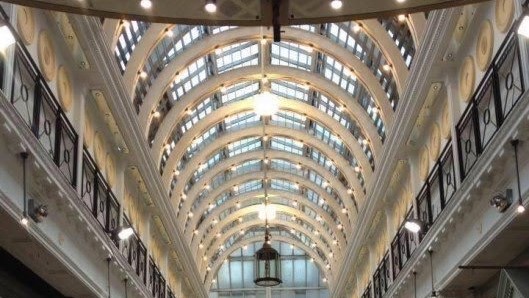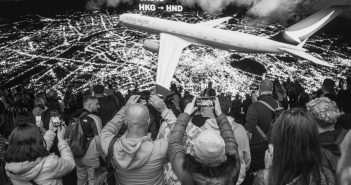Covid-19 has perhaps spelt a temporary death for, amongst many other things, flaneurship – that is, the practise of being able to wander throughout a city freely and unobstructed, making observations as one goes. Peter O’ Neill’s latest collection addresses the flaneur directly. With a background in translation, academia and his long- avowed admiration of Beckett and Baudelaire (to whom the flaneur label is most regularly attached), O’ Neill puts his own unique slant on Dublin, and he is not alone.
Henry Street Arcade is a bilingual edition, with O’ Neill’s poems in English appearing alongside their French translations by French novelist and poet Yan Kouton. This is an indicator that O’ Neill is a poet who must, out of necessity, operate always between dualities.
Henry Street Arcade forms the end of his Dublin Trilogy, a triumvirate of poem sequences centred around Dublin, which include The Dark Pool and Dublin Gothic. The collection’s title comes from the name of a commercial passage located just off O’ Connell Street, built in the style of a Parisian arcade. A loose sequence of a single day in Dublin is gradually formed, in the title which directly addresses the arcade, O’ Neill asserts:
It evokes the cave which according to Vico,
In Scienza nuova, Plato singles out as the origin
Of civilisation.
Like Baudelaire and Joyce before him, O’ Neill’s aesthetic lies in transplanting ancient, iconic mythologies into a contemporary setting, underscoring its timelessness with regards to the human condition. In his case, it is a freewheeling mix of classical and literary understandings, now set to the backdrop of Dublin’s streets and architectural mismatches, that frames his poetry. He gives us a city in a state of uncertain but unstoppable transition, one in which the ideals of Ireland’s revolutionary past seem to hold little relevance to the social ills that continue to plague the very city – itself in the grip of lethal capitalistic freefall – in which they were first enacted. This constant collision between mundane, everyday reality and the author’s eye for both myth and observational capacity lends it a finely-tuned tension.
In ‘Portrait of a Woman on a Train’, he writes: “Her handbag/Hangs from the gentle scaffold of her arm/The murderous black leather having been tattooed/With bolts of burnished gold, also bearing/The holy runes of some designer’s name. What inside does the urban Pandora bring?’
O’ Neill almost seems to revel in this dualism. His own philosophy can perhaps be surmised with a line from the poem ‘Portrait of a Woman’: ‘Beauty must always be contrasted with banality.” His continual pairing of the two also becomes a way of interrogating whether making sense of the city is even a worthwhile endeavour.
As an ultramodern metropolis of cosmopolitan glamour and multicultural receptivity, the social blights of homelessness, poverty, addiction and waste also remain on full display. Even a crushed coffee cup: ‘The premium of price per individual coffee/Reflecting back the macro environment of the/Property world which the cafe finds itself in.’ – is indicative of a society in extreme disrepair.
A later poem, ‘Heraclitus’, describes: On the high street, in broad daylight, Bordello chic is promoted in plain view. And for all to see – though they pass by unseeing! Our age is one of casualised distraction – the ubiquity of screens, whether from phones, laptops, tablets in the majority of peoples’ lives, necessary for both business and pleasure – conference calls and dating sites, social media as well as the commercial necessity for businesses to have and maintain an ‘online presence’.
Running through Henry Street Arcade is a desire for a sense of mystery – arguably essential to the poetic imagination – to be returned to an age, as O’ Neill describes it, ‘of blinding all-seeing, all knowing/All encompassing… nothing!’ He urges the reader to ‘Reappraise/The splendour of the shades and the shadows.’ This is not a call to return to a state of benightedness – it is a call to acknowledge that there is still a place for beauty in a world that seems to be increasingly accelerating.
By Peter O’ Neill trans. Yan Koutan. Editions Du Pont de L’Europe, 95p, €12.00 ISBN: 978-2-36851-573-0




